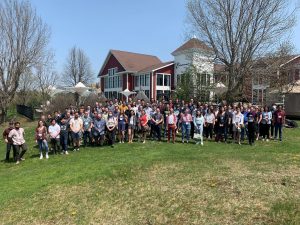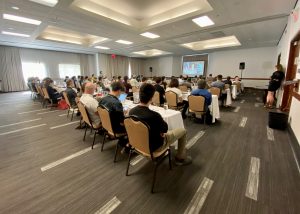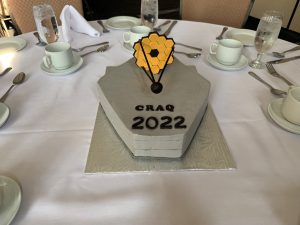Reunions and Discoveries at the 2022 CRAQ Annual Meeting!
 After two years of absence, the annual meetings of the Center for Research in Astrophysics of Quebec are back in person! Bishop’s University received the CRAQ astronomers on May 11, 12 and 13 at the Estrimont Hotel in Orford.
After two years of absence, the annual meetings of the Center for Research in Astrophysics of Quebec are back in person! Bishop’s University received the CRAQ astronomers on May 11, 12 and 13 at the Estrimont Hotel in Orford.
At the outset, diversity issues were in the spotlight with a presentation on gender disparities in research by Vincent Larivière, a tenured professor at the School of Library and Information Science at Université de Montréal. This segment also made it possible to introduce the CRAQ’s brand new equity, diversity and inclusion (EDI) committee and the mandate it has given itself.
During the three-day event, the members presented their most recent research results in front of more than a hundred graduate students, researchers and professors! Many noted the high quality and diversity of the 67 presentations. Among the many topics, we learned about the potential candidate emitters of fast radio bursts, the results of multiple spectroscopic analysis of different types of stars, as well as the most recent news of the SITELLE spectrometer and its data, and new methods for analyzing gravitational lenses and galaxies. Several successful education and scientific communication initiatives from CRAQ members in recent years were also presented.
 Thursday morning, it was with enthusiasm and excitement that those present watched live the unveiling of the first image of the Sagittarius A* black hole in the center of the Milky Way!
Thursday morning, it was with enthusiasm and excitement that those present watched live the unveiling of the first image of the Sagittarius A* black hole in the center of the Milky Way!
Stefan Pelletier, doctoral candidate at Université de Montréal, won the prize for the best presentation of the meeting with his results on the composition of the atmosphere of a hot Jupiter-like exoplanet. Caroline Piaulet, also a doctoral candidate at Université de Montréal, won the second prize with a presentation on her research on the nature of the planets of a multiplanetary system.
 Although the days were busy, they ended with a convivial meal allowing exchanges and new encounters. Members shared a cake shaped like the recently deployed James Webb Space Telescope, a project to which several CRAQ members contributed significantly.
Although the days were busy, they ended with a convivial meal allowing exchanges and new encounters. Members shared a cake shaped like the recently deployed James Webb Space Telescope, a project to which several CRAQ members contributed significantly.
–by Érika Le Bourdais, 2022 Sureau summer scholar in science communication
